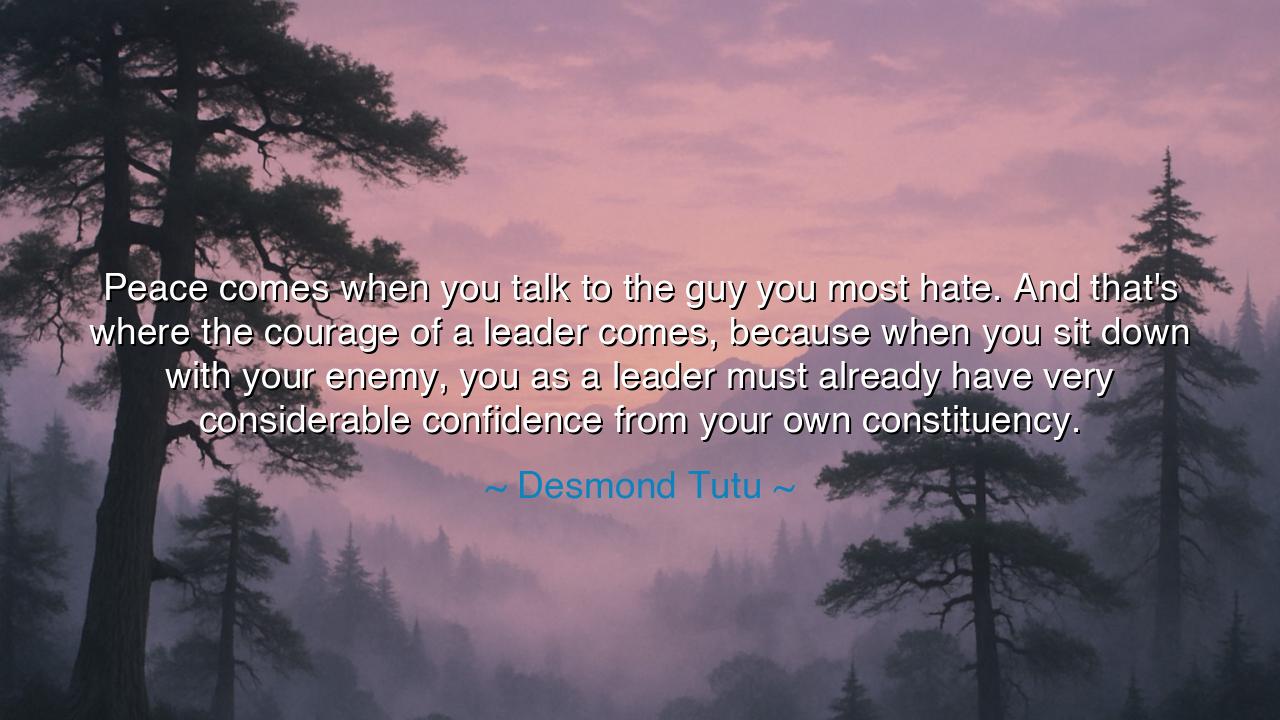
Peace comes when you talk to the guy you most hate. And that's
Peace comes when you talk to the guy you most hate. And that's where the courage of a leader comes, because when you sit down with your enemy, you as a leader must already have very considerable confidence from your own constituency.






In the stirring and profound words of Desmond Tutu, the moral voice of reconciliation and justice, we are confronted with a truth that tests the very limits of the human heart: “Peace comes when you talk to the guy you most hate. And that's where the courage of a leader comes, because when you sit down with your enemy, you as a leader must already have very considerable confidence from your own constituency.” Here lies the essence of leadership — the daring to confront animosity, to face those who oppose us, and to seek dialogue where anger, fear, and distrust reign. True courage is revealed not in triumph over foes on the battlefield, but in the bravery to sit at the same table, seeking understanding and reconciliation.
The origin of this insight is deeply rooted in Tutu’s own life and ministry in apartheid and post-apartheid South Africa. As Archbishop, he witnessed the corrosive power of hatred, division, and systemic injustice. Yet he understood that sustainable peace could not be achieved through vengeance or isolation. It required engagement with the very people whose actions had wrought pain. To meet the enemy with openness — and to do so with the support and trust of those who look to you for guidance — is the hallmark of leadership and moral courage. In this, Tutu illuminates the path from conflict to peace, demonstrating that dialogue, however uncomfortable, is the crucible of reconciliation.
The meaning of this quote is profound. It teaches that courage is inseparable from confidence and principle. To confront the person one most despises is not merely an act of bravery, but an act rooted in moral clarity and inner strength. A leader cannot seek peace without first securing the trust and faith of their people, for leadership demands both accountability and authority. The courage Tutu speaks of is not reckless boldness, but the measured, deliberate willingness to embrace risk in pursuit of justice and the greater good.
History provides luminous examples of this principle in action. Consider Nelson Mandela, who, after twenty-seven years of imprisonment, emerged not with vengeance but with an invitation to dialogue. He met his former oppressors with humility and purpose, negotiating the transition to a democratic South Africa. Mandela’s courage was magnified because he had the confidence of his people and the moral conviction to seek reconciliation over retaliation. Through these actions, he exemplified Tutu’s wisdom: peace is born at the table where enemies dare to meet, and courage is the bridge that spans hatred.
Even in more ordinary lives, this truth resonates. The teacher who reconciles with a former adversary to guide a student, the community leader who mediates between feuding neighbors, the family member who seeks dialogue after years of estrangement — all embody the courage Tutu speaks of. These acts demand patience, empathy, and confidence in the righteousness of one’s cause, for only with these qualities can one approach the person who is feared or despised and find the path to peace.
This teaching also underscores the delicate balance between courage and responsibility. Engaging with an enemy is not an act of personal indulgence, but a deliberate choice made in the service of a greater good. It requires that the leader maintain moral integrity, resist the seduction of pride, and hold firm to principle even when the encounter is fraught with danger and tension. Courage, in this sense, is inseparable from ethical vision and the capacity to inspire trust.
The practical lesson is clear: seek dialogue where animosity reigns, act with confidence in your convictions, and never underestimate the transformative power of conversation guided by justice and respect. True leadership, as Tutu demonstrates, is measured not by the absence of opposition, but by the willingness to confront it, not with weapons or rhetoric, but with the courage of heart and the wisdom of principle. Peace is born where fear and hatred are met with understanding and resolve.
So, my child, carry Tutu’s wisdom into your life: do not shrink from those you fear or despise. Sit with them, speak with them, and listen with humility and courage. Let your actions be guided by justice, your confidence rooted in principle, and your purpose aligned with the common good. In this, you will discover that the greatest courage is not in defeating enemies, but in transforming enmity into peace, and that the enduring strength of a leader lies in the heart willing to build bridges where others see only chasms.






AAdministratorAdministrator
Welcome, honored guests. Please leave a comment, we will respond soon